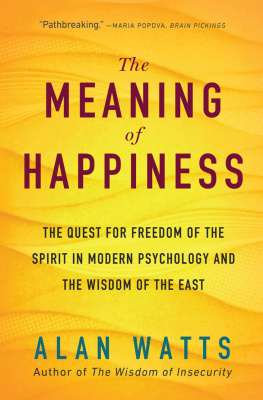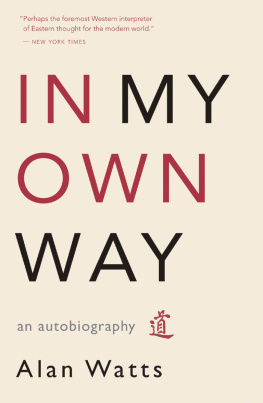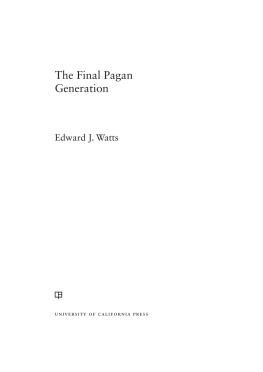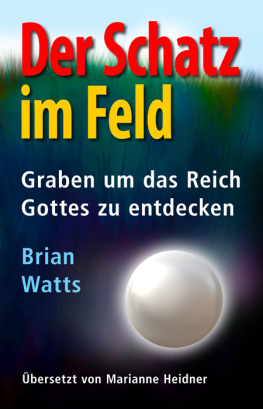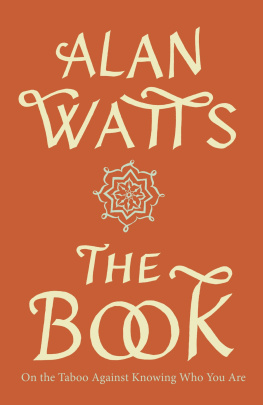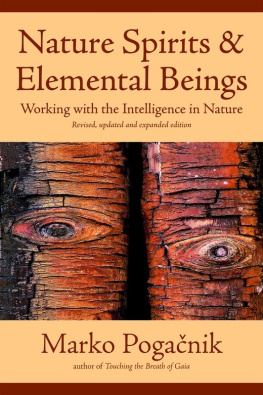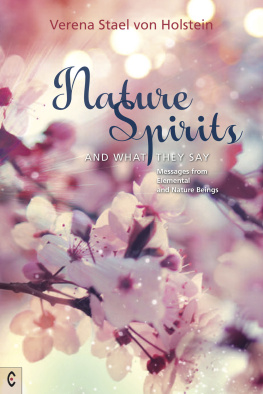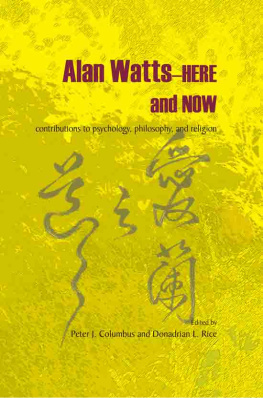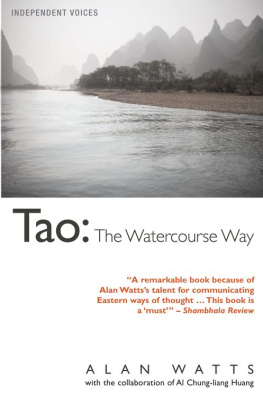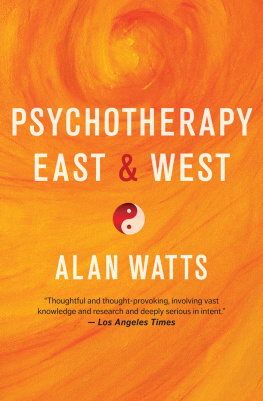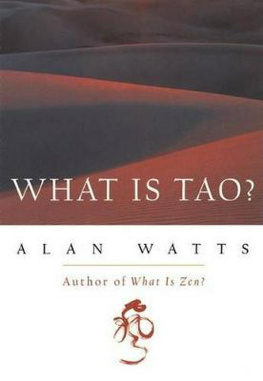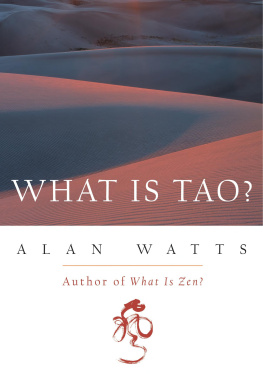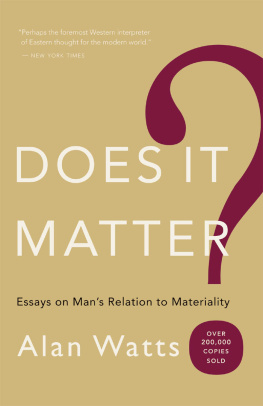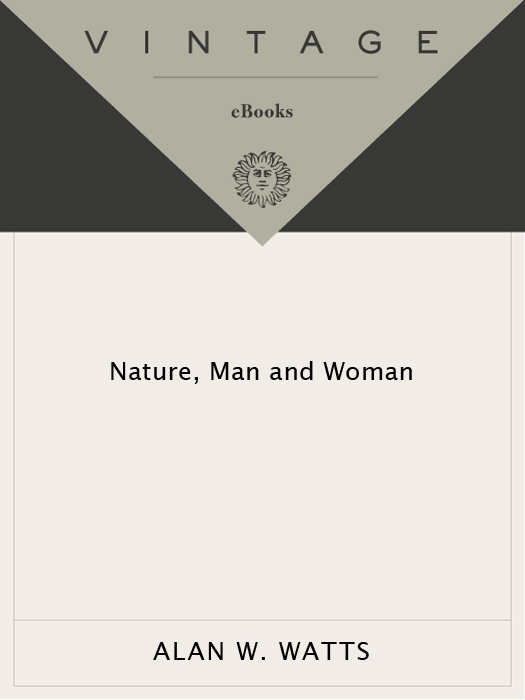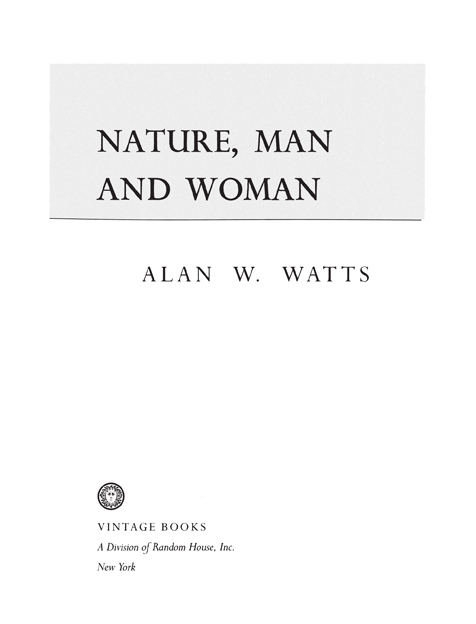ALSO BY ALAN W. WATTS
The Art of Contemplation
Behold the Spirit
Beyond Theology
The Book
Cloud-Hidden, Whereabouts Unknown
Does It Matter?
In My Own Way
Psychotherapy East and West
The Supreme Identity
Tao
This Is It
The Way of Zen
The Wisdom of Insecurity
Vintage Books Edition, March 1991
Copyright 1958 by Pantheon Books, Inc.
Copyright renewed 1986 by Mary Jane Watts
All rights reserved under International and Pan-American Copyright Conventions. Published in the United States by Vintage Books, a division of Random House, Inc., New York, and simultaneously in Canada by Random House of Canada Limited, Toronto. Originally published by Pantheon Books, Inc., in 1958.
Library of Congress Catalog Card Number: 90-50166
eISBN: 978-0-307-82298-7
v3.1
To the beloved company of the stars, the moon, and the sun;
to ocean, air, and the silence of space;
to jungle, glacier, and desert,
soft earth, clear water, and fire on my hearth.
To a certain waterfall in a high forest;
to night rain upon the roof and the wide leaves,
grass in the wind, tumult of sparrows in a bush,
and eyes which give light to the day.
Contents
Preface
A S I LOOK AROUND MY LIBRARY I AM OFTEN strangely troubled by the way in which my books fit so snugly into categories. Most of my books have to do with philosophy, psychology, and religion, and they represent points of view from every great culture of the world. Yet with an absolutely oppressive monotony they fit themselves into the stale dualities of philosophical and theological argument, varied from time to time with sensible and uninspiring compromises. Volume after volume is so easily identified as supernaturalist or naturalist, vitalist or mechanist, metaphysical or positivist, spiritualist or materialist, and the compromise volumes are usually so watered down as to be compilations of platitudes and sentimentalities.
Underlying all these dualities there seems to be a basic division of opinion about those two great poles of human thought, spirit and nature. Some people stand plainly for one and against the other. Some stand mainly for one but give the other a subordinate role. Others attempt to bring the two together, though human thinking moves in such firm ruts that it usually turns out that they have settled inadvertently for one or the other. It is doubtless foolhardy for any philosopher to claim that he has broken loose from these ruts and at the same time said anything meaningful. Discussion is so much a matter of juggling with categories that to start breaking up the categories is usually to break up the discussion.
But this is not just a matter of categories, logic, and philosophical argument. The opposition of spirit and nature is also a matter of life and feeling. Ever since I began to study these matters I have been puzzled by the way in which exponents of the life of the spirit do not seem to be at home in nature and in their bodies, for even when they do not identify the natural with the evil they damn it with faint praise. So often I have sympathized with bold pagan rebellion against this bodiless spirituality, and yet never joined it because the final word of this gather ye rosebuds while ye may philosophy is always despairor some fatuous utopianism which, because it is only a matter of time, comes to the same thing. For the congenitally sick, the victims of accident, the impoverished, and the dying this philosophy has no message.
But is the alternative to joy in the body delight in the discarnate spirit? I have been realizing more and more that partisans to opposed philosophies share the same premises, which are usually unconscious. Furthermore, these premises are transmitted by such social institutions as the structure of language and the learning of roles, influencing us in ways of which we are hardly aware. Thus the conventional saint and the conventional sinner, the ascetic and the sensualist, the metaphysician and the materialist may have so much in common that their opposition is quite trivial. Like alternating heat and cold, they may be symptoms of the same fever.
Unconscious premises of this kind come to light when we try to understand cultures very far removed from our own. They too have their hidden assumptions, but when we compare these cultures with our own the basic differences must at last become obvious. This is peculiarly true of the cultures of the Far East, because they are high civilizations which arose in isolation from the West, developing patterns of thought and language startlingly different from those of the Indo-European strain. Thus the value of the study of Chinese language and thought is not simply that we ought to be able to communicate with the Chinese people, important as this is. It is rather that Chinese studies tell us so much about ourselves, for the very reason that of all the advanced cultures of the world this is the most unlike our own in its ways of thinking.
Thus it was always such a delight to me that Chinese philosophy would never quite fit into the ruts of Western, and even Indian, thought, and this was pre-eminently true of the problem of spirit and nature. For there were no categories of Chinese thought corresponding to spirit and nature as we understand them. Here was a culture in which the conflict between spirit and nature hardly existed, a culture where the most naturalistic painting and poetry were precisely the most spiritual of its art forms.
This book is not, however, a formal account of the Chinese philosophy of nature. I have discussed this at length in my previous book, The Way of Zen, and it has been marvellously illuminated by Joseph Needham in his Science and Civilization in China. My object here is not to expound and compare philosophical systems; it is to reflect upon a great human problem in the light of the Chinese view of nature, especially as it was expressed by Lao-tzu and Chuang-tzu. The urgency of the problem of mans relation to nature and the general intent of this book are, I think, sufficiently discussed in the Introduction which follows. Here I have also explained why the problem of mans relation to nature raises the problem of mans relation to womana matter about which the spiritually-minded members of our own culture have been significantly squeamish.
Because this book is one in which I am frankly thinking out loud, I would like to repeat some remarks from the Preface to my Supreme Identity. I am not one who believes that it is any necessary virtue in the philosopher to spend his life defending a consistent position. It is surely a kind of spiritual pride to refrain from thinking out loud, and to be unwilling to let a thesis appear in print until you are prepared to champion it to the death. Philosophy, like science, is a social function, for a man cannot think rightly alone, and the philosopher must publish his thought as much to learn from criticism as to contribute to the sum of wisdom. If, then, I sometimes make statements in an authoritative and dogmatic manner, it is for the sake of clarity rather than from the desire to pose as an oracle.
There is the prevalent belief in the West that intellectual and philosophical pursuits are unessential ornaments of culture of far less value than active and technological accomplishments. This attitude is in great danger of being confused with the Eastern view that real knowledge is nonverbal and beyond the reach of concepts. But our actions are almost invariably directed by a philosophy of ends and values, and to the extent that this is unconscious it is liable to be bad philosophy with disastrous active consequences. The so-called nonintellectuality of the East lies as far above thought as mere activism lies below it. Such knowledge cannot be reached by making ones concepts unconscious under the impression that one is sacrificing the intellect. Distorting premises can be abandoned only by those who go down to the roots of their thinking and find out what they are.


